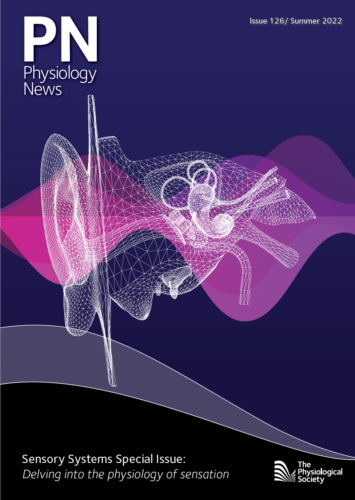
Physiology News Magazine
RNID: Making life inclusive for deaf people and those with hearing loss
Our research priorities and themes
News and Views
RNID: Making life inclusive for deaf people and those with hearing loss
Our research priorities and themes
News and Views
https://doi.org/10.36866/pn.126.10
Dr Tracey Pollard
Research Programme Lead, Royal National Institute for Deaf People (RNID)
Hearing loss affects 1 in 5 adults in the UK. It’s an invisible condition that can have a devastating effect on relationships, education and job prospects. It’s also a growing problem in an ageing population – we estimate that 15.6 million people in the UK will have hearing loss by 2035. Tinnitus, noise in the ears or head that doesn’t have an external source, affects around 7.1 million people in the UK. It can have a serious impact on people’s quality of life, causing problems with sleep and concentration, as well as stress and anxiety.
There’s a frustrating lack of patience, empathy and understanding for people who are deaf or have hearing loss. Barriers to work, travel and communication take a toll on mental wellbeing and cause social isolation.
RNID have been helping people with hearing loss for more than 100 years, and we’ve already changed the lives of millions. We want to make life fully inclusive for deaf people and those with hearing loss or tinnitus. We campaign for an inclusive society, connect people to practical advice and fund research to support the development of new treatments for hearing loss and tinnitus.
We’ve been funding research into treatments since 1999. Back then, most applications were for research into medical devices – hearing aids and cochlear implants. There were fewer applications from researchers working on hair cell regeneration, tinnitus, ototoxicity (caused by medications that damage cells in the inner ear as a side effect, leading to hearing loss) or protection of the auditory system from noise damage.
Over time, that has shifted – in particular, we now see more applications focused on developing specific treatments for hearing loss or tinnitus. In response to this shift in the field’s priorities, we set up a new programme to fund translational research in 2011, providing a dedicated source of funding to move potential therapies along the research pipeline. More recently, we set up our Hearing Therapeutics Initiative, through which we offer a broad range of support to innovators within academia and biotech or pharmaceutical companies.
We currently focus on three main areas of research:
Preventing hearing loss
We fund research to better understand the cellular and molecular mechanisms that underlie hearing difficulties and advance the development and testing of treatments to prevent any type of hearing disorder.
Restoring hearing
We fund research that will lead to transformative improvements to the quality of hearing gained from medical devices. We also fund research to advance the development and testing of drug, gene or cell-based therapies to repair damage to any part of the auditory system to improve hearing.
Silencing tinnitus
We fund research to improve our understanding of the biological mechanisms involved in tinnitus and to develop and test new approaches to reduce the perception of tinnitus.
Through our funding schemes, we aim to accelerate the discovery and development of new treatments. We’re also working to ensure that we include the needs of people with hearing loss or tinnitus when setting priorities for our research funding, to ensure that the work we fund will bring them the benefit that they want.
We fund project grants (at both the discovery and translational research stages), fellowships and PhD studentships. We also have a pump-priming pilot grant scheme to kickstart new lines of research. Applications to our schemes go through a rigorous peer-review process so that we can be sure we’re funding the best research.
Our grant schemes have deadlines throughout the year. We want to see applications from researchers we’ve not had contact with before, so if your research fits our remit, please consider applying to us – there’s more information on our website: https://rnid.org.uk/researchfunding.
Recently, our funding helped researchers at King’s College London to identify 44 new genes linked to age-related hearing loss1. The researchers used data from the UK Biobank (which tracks different health characteristics in 500,000 people aged between 40 and 69 over time) to find these new genes. Before this, only a handful of genes had been linked to the condition. The discovery of these genes will improve our understanding of the mechanisms involved in age-related hearing loss, allowing the development of more targeted treatments to slow the onset of, or treat, hearing loss.
References
Wells HRR et al. (2019). GWAS identifies 44 independent associated genomic loci for self-reported adult hearing difficulty in UK biobank. The American Journal of Human Genetics 105, 788-802 https://doi.org/10.1016/j.ajhg.2019.09.008.
